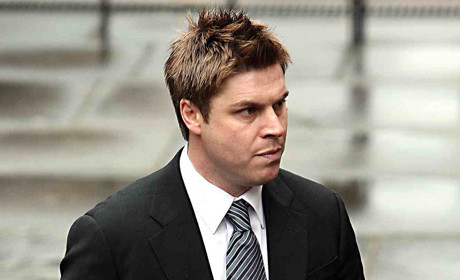
Flitcroft told the public inquiry that reports on his private life had been 'unfair' on his family and that he saw no public interest in doing so
Credit: Sean Dempsey/PAFormer footballer Garry Flitcroft has spoken of the "grief" caused to his family when an injunction stopping the press from publishing reports of an affair was lifted.
Flitcroft, who is now manager of Chorley football club, told the Leveson inquiry today that he saw no public interest in reporting on the details of his private life, and that it had been "unfair" on his family.
Asked to comment on his "speculation" and suspiscion that his phone could have been hacked, he accepted he had no evidence of this, but said when the press claimed to have further information "it seems a massive coincidence".
Flitcroft told the inquiry that legal representatives told him "to expect the worst" if the injunction were to be lifted, adding that at one point more than 20 reporters assembled outside the gates to his home.
"Going on top of that there was a helicopter taking pictures above my house ... [they] wanted to make a statement to me never to take on the press again."
He disclosed to the committee that his legal attempt to keep information private cost around £190,000. But despite the injunction having been lifted in 2002, he said chants about him still take place today in the football stands, which are heard by his children.
"The littlest one was only young then so didn't get much attention, it was only later on in life now he does do ... teasing him at school. He comes to watch me and there are other fans that sing chants about his dad.
"When your lad's watching you play football and at an age where they know what's going on, it's unfair."
He added that he did not see himself as a "high profile player" and, in reference to an article which asked "Garry who?" when the affair was reported added that there was "no reason why my private life should be of public interest".
"I never caught myself in the papers … there were a lot more high profile people than me. But for people to say it has to be published in the public interest and then say Garry who?
"... It was private, between me and Karen and no reason why my private life should be of public interest.
"If I been done for match fixing or taking cocaine then that's in the public interest but I disagree with them putting it in."
He was also asked to speak of the impact of this on his relationship with his father-in-law – who he said suffered from Parkinsons disease – and father – who he said had suffered depression – both of whom he said he had always been very "close" to.
"I was very close to him [father-in-law], and to have press turning up on the doorstep is totally wrong for a story about his daughter when he was critically ill.
"Obviously he didn't need it at the time … as a family they didn't need the grief of what was going on between me and Karen."
He added that from the age of seven his own father had attended every game he played.
"I was his life, he loved coming to watch me play football."
But following the reporting of Flitcroft's private life he said "it definitely changed".
"He stopped coming to watch me play football ... He just said I can't come and watch you again."
Over time he said his father "became very housebound" and in 2008 committed suicide, which was six years after the injunction was lifted.
When asked if he believed there was a link between this and the lifting of the injunction he accepted "it's a long time" but added that "all I can say is it affected him a lot".
"Papers say we're role models. We're doing a job and that's playing footie. If that puts you in the public eye surely it doesn't affect your private life. It should have been something me and Karen dealt with."
Free daily newsletter
If you like our news and feature articles, you can sign up to receive our free daily (Mon-Fri) email newsletter (mobile friendly).
Related articles
- Newsrewired throwback: What you learned at our previous digital journalism conference
- Three steps to protect newsrooms from press freedom attacks
- What journalists can do to prevent and fight SLAPPs
- First-party cookies: 'Get legal help to avoid fines'
- Collecting first party data: Why meaningful consent should matter to publishers











